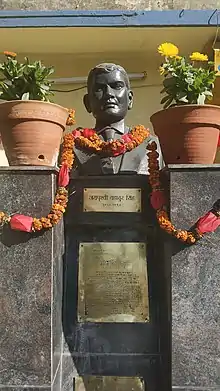Jaya Prithvi Bahadur Singh
Jaya Prithvi Bahadur Singh (23 August 1877 – 15 October 1940), was a humanist, peace advocate, writer and social activist from Nepal.[1] He devoted his life to social welfare and world peace. He is known mainly for humanitarianism, peace advocacy and human rights advocacy for education. He also contributed to the development of education, literature, journalism and health.
Jaya Prithvi Bahadur Singh | |
|---|---|
जयपृथ्वी बहादुर सिंह | |
 Statue of Jaya Prithvi Bahadur Singh (21 August 1877 – 15 October 1940) in front of Gorkhapatra corporation Newroad, Kathmandu | |
| Born | 23 August 1877 Bajhang, Nepal |
| Died | 15 October 1940 (aged 63) Bangalore, India |
| Nationality | Nepali |
| Occupation | Humanist, writer, peace advocate, social activist |
Raja Jaya Prithvi Bahadur Singh, the eldest son of King Bikram Bahadur Singh and Rudra Kumari Singh (daughter of the then Prime Minister Sri 3 Maharaj Jang Bahadur Rana) of Bajhang vassal State, was born on 20 August 1877 in Chainpur, Bajhang. He was married to Khageshwari Devi daughter of then Prime Minister Chandra Shumsher Jang Bahadur Rana.[2]
Singh began his education when he was five years old. His creativity became obvious in his early childhood years, and consequently he was moved to the Thapathali Darbar School in Kathmandu at the age of eight. After completing his primary education he was admitted to Durbar High. Jaya Prithvi received her higher education from India. He matriculated from Calcutta University in 1895 and I.A. from Allahabad College in 1897. And graduated in law from the University of Calcutta in 1906.
After completing his studies, Singh established an Ayurvedic hospital for the local people. He established a system of giving Mohani haaq (law related to land) in the society. He constructed many roads and bridges for the facility of the people of the community. He established a primary school where poor children could get an education.
Singh brought social reforms and wrote books on different subjects. He is known as "the first person of Nepal to write grammar". He worked with the first Nepalese newspaper, Gorkha Patra.
The authorities scrutinised his activities and Singh was forced to leave the country in 1891. He lived in exile in Bangalore and established The Humanity newspaper and the J.P. Institute. During the Italian invasion of Ethiopia, Singh volunteered to treat the war casualties and was imprisoned by the Italians. He was also imprisoned by the British for his involvement in the revolutionary movement in India.
He died at the age of 63 on 15 October 1940.
References
- Singh, Padma B (28 August 1998). "Humanism and Jai Prithvi Bahadur Singh". The Nepal Digest.
- Bhandari, Ratan. "जयपृथ्वीको मावली होइन तारुका". Annapurna Post. Retrieved 18 January 2021.